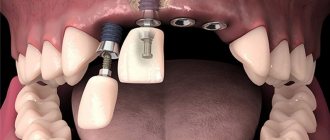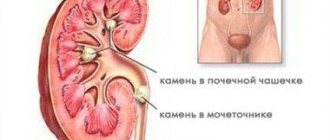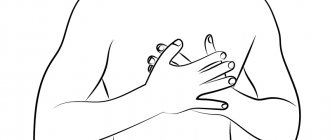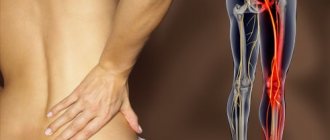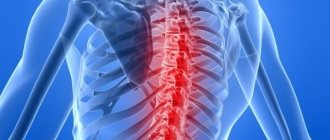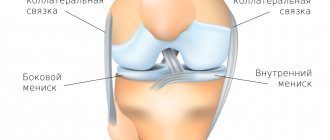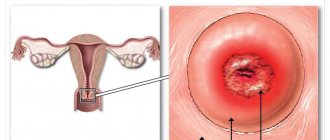Psychotherapist
Krashkina
Irina Ivanovna
30 years of experience
Psychotherapist, Candidate of Medical Sciences, member of the Russian Professional Psychotherapeutic League
Make an appointment
Quite often on various Internet forums there are questions about what kind of disease bulimia is or how to treat bulimia. This disease is often confused with anorexia, but these pathologies have significant differences. This disease is not fatal, but the quality of life of affected people is significantly reduced. In the absence of qualified medical care, the disease can have a negative impact on a person’s overall health.
Bulimia nervosa is an eating disorder whose primary goal is the sufferer's desire to control their weight by taking steps to prevent weight gain. A characteristic feature of the pathology is repeated bouts of overeating. The sick person cannot resist absorbing a large amount of food that exceeds the total caloric content of the body's needs, but at the same time uses all available methods to prevent the absorption of food.
Bulimia belongs to a group of neuropsychiatric disorders. Experts distinguish two types of pathology:
- nervous, which affects people over 25 years of age seeking relief from stress. This type of pathology can occur due to low self-esteem, mental disorders, poor heredity or diseases of the endocrine system;
- puberty, typical for teenage girls. It is characterized by alternating bouts of uncontrolled overeating with prolonged periods of lack of appetite.
Stages of pathology
Psychologists distinguish 3 stages of the disease:
- an unconscious stage in which the patient may eat food at night, as a result of which he experiences a feeling of guilt. There are no serious deviations, so it is difficult to diagnose the problem;
- the stage of awareness at which overeating becomes persistent, which causes constant feelings of guilt, phobias, fears, and depression. The patient cannot control the process of eating, and emptying the stomach becomes necessary, including due to pain, dizziness, and stomach discomfort;
- the action stage in which people with bulimia begin to understand that there is a problem.
The success of treating the disease depends on the timeliness of seeking medical help.
The essence of the disease
The main symptom of the disease is overeating. It usually becomes a reaction to stress. At the same time, food can be perceived as punishment. The amount of food consumed during attacks significantly exceeds the standard. At the same time, a person cannot accurately determine whether he really feels such strong hunger.
The patient hides the disorder in every possible way: in public he eats as usual or even less, and loses control in solitude. After this, he feels guilty for what happened and forcibly cleanses his stomach. More often, people with such a mental disorder induce vomiting and use laxatives. The disease periodically recurs: each new round lasts about three months. Episodes of overeating occur at least once a week.
Symptoms and signs of bulimia
If bulimia occurs, the symptoms in most cases are characteristic, which simplifies the diagnosis:
- a person does not stop while eating even when he feels full;
- the patient is constantly looking for a way to prevent weight gain;
- the patient evaluates his body very critically, and the evaluation affects self-esteem;
- the feeling of hunger does not subside even while eating;
- problems with the digestive organs begin;
- salivation increases;
- inflammation of the throat becomes more frequent;
- dermatitis appears;
- moral and physical strength weakens.
Despite the fact that signs of bulimia develop, the weight of patients remains within normal limits.
Are you experiencing symptoms of bulimia?
Only a doctor can accurately diagnose the disease. Don't delay your consultation - call
How to save a loved one
As already mentioned, people suffering from overeating do not want to admit their problem, hide it, and thereby harm themselves. The task of relatives and loved ones who notice the symptoms of bulimia is to gently push the patient to the decision to visit a doctor. The following will help you gain trust and explain the need to consult a specialist:
- Study as much information as possible about eating disorders, its manifestations and dangers, in order to fully and clearly convey it to the bulimic.
- The patient may strongly dislike the fact that you have found out his secret; he is capable of showing aggression. You need to be patient and try to build trust.
- You cannot put pressure on a person, and if at the moment he does not want to talk, postpone the conversation until he gathers his strength and wants to listen to you.
- Convince the patient that you do not want to humiliate him, but simply to help.
- Encourage the bulimic to express emotions about their life and condition.
- Focus the conversation on the fact that it is very difficult for any person to admit to addiction, so your interlocutor is great if he can do this.
- Promise the patient that you will not tell anyone about his illness. However, this can be done if he is ready to turn to specialists.
- Convince the bulimic that if he decides to undergo treatment, he will definitely succeed.
When communicating with such a patient, you cannot say that you are nervous about him, putting your feelings above his, manipulate, or behave as if you know everything. Under no circumstances should you say to him the following words: “Can’t you stop eating so much? Eat normally, you’re not fat.” This devalues the problem.
Causes
For bulimia to develop, there can be a variety of reasons. The main reasons for the development of pathology are:
- hereditary predisposition;
- constant food restrictions and strict diets, which resulted in nutritional deficiencies;
- disruption of metabolic processes in the body;
- damage to the food center in the brain;
- psychological problems;
- hormonal imbalances;
- intense regular negative emotions.
One cause is sufficient for the occurrence of pathology, although in most cases there is a combination of causes.
External manifestations of the disorder
The appearance of bulimics becomes a kind of indicator of the “ugliness” going on in their bodies. They are revealed by dry, dull skin that loses moisture due to dehydration. The dermis loses turgor and provokes the appearance of wrinkles.
Swelling disfigures the face. The girl, who is barely 20 years old but has been suffering from bulimic disorder for four years, says that her face has somehow inexplicably widened. The face is swollen, and the cheeks stick out shapelessly.
The hair of people with this disorder loses its beauty, becomes dull, lifeless, and falls out immensely. The nails soften and crumble, and on those fingers that the patient places in the mouth, they are destroyed and deformed to an even greater extent.
But the most interesting thing is: no matter how hard a bulimic tries to get rid of what he eats, he does not lose weight. And there are logical explanations for this. Firstly, such ruthless interference with the body’s physiology slows down metabolism and reduces the rate of calorie burning. Secondly, from the moment the process of food absorption begins until vomiting is provoked, more than 50% of calories are absorbed and then turn into fat.
Obviously, vomiting does not save you from extra pounds. Slow metabolism and poor diet are taking their toll.
Risk factors
Bulimia can develop under the influence of the following factors:
- if you have relatives or one relative with eating disorders;
- if the patient is exposed to stress or experiences emotional turmoil (in some cases, severe stress alone is enough);
- if the patient has high emotional sensitivity of an innate nature;
- if there are periods of emotional instability under the influence of external factors.
Young women and girls who want to create an ideal body are at risk. In men, the majority of pathologies develop due to diseases of internal organs or mental illnesses.
Consequences for ENT organs
With bulimia, the throat often suffers. On the one hand, the cause is the same vomiting, which irritates the tissues. On the other hand, microtraumas have an effect - by pressing on the root of the tongue, a person often injures the mucous membrane. Against this background, a set of unpleasant symptoms appears:
- pain or soreness;
- constant desire to cough and clear your throat;
- inflammatory diseases due to wound infection.
It is not difficult to get an infection. If a patient does not control hunger, he is unlikely to think about keeping his hands clean. And vomit contains a lot of bacteria. Sometimes stomach contents end up in the nose. This often causes inflammation of the mucous membrane or sinuses.
Many patients have a chronic runny nose (although weakened immunity also affects this). But there is a more serious complication. Getting vomit into the nose is dangerous due to aspiration of the respiratory tract. It provokes, at a minimum, pneumonia, and at maximum, suffocation.
Complications
In order to understand that constant forced cleansing of the stomach after eating food will not leave its mark on the body, you do not need to be an expert. The health effects of bulimia can be minor or devastating depending on the stage of the disease and the person's health status.
The most common consequences of bulimia are:
- decreased blood pressure to the point of fainting;
- alcohol or drug addiction;
- heart failure;
- violation of metabolic processes;
- deterioration of skin, hair, teeth;
- neurasthenia;
- loss of calcium by the body, which can result in confusion, lethargic numbness, irregular heart rhythm, and kidney failure;
- nausea, constipation;
- swelling of the legs and arms;
- miscarriages in pregnant women.
Among the social consequences, the main ones are loss of interest in life and difficulties in communication, including with loved ones. Taking into account these consequences, it becomes clear that numerous questions arise on the topic of how to get rid of bulimia.
Consequences for the oral cavity
A common symptom of bulimia is erosive destruction of tooth enamel. The reason for this is frequent episodes of vomiting. Along with food, the stomach also expels a small amount of juice. It contains hydrochloric acid, which corrodes enamel. The more often a person vomits, the stronger the acid attack on the teeth. In addition to caries, the following are observed in the patient’s mouth:
- unpleasant odor due to constantly introduced bacteria;
- salivary glands enlarged due to inflammation;
- ulcers on the mucous membrane (injuries are usually caused by nails when inducing vomiting).
The patient’s teeth often turn yellow, become sensitive, and react to cold and hot foods. The gums become inflamed, which, if left untreated, can lead to periodontal disease. Without timely treatment, this threatens tooth loss.
When to see a doctor
The effectiveness of treatment for this disease depends on how promptly the patient consults doctors. The disease is treated by a psychotherapist who can refer the patient for consultation with a psychiatrist and nutritionist.
You should seek medical help as soon as possible if:
- there is no feeling of satiety;
- periodically there are attacks of overeating, which the patient does not control;
- there is a fear of gaining excess weight;
- the patient is dissatisfied with the appearance;
- Eating alone is preferable;
- the patient is afraid to start eating because he will not be able to stop;
- after eating, a feeling of irritation and anger appears;
- behavior becomes impulsive.
JSC "Medicine" (academician Roitberg's clinic) in Moscow offers the services of qualified psychotherapists and psychiatrists in the field of treatment of bulimia. The clinic is located at the address: 2nd Tverskoy-Yamskaya lane, building 10, a 5-minute walk from the Moskovskaya metro station. Highly qualified psychotherapists and the use of modern treatment methods allow patients to be confident in the success of therapy.
Effects on the digestive system
Since with bulimia a person interferes with the normal functioning of the gastrointestinal tract, numerous disorders are observed in this area:
- Esophagitis. The most common symptom of this disease. The esophagus becomes inflamed under the influence of hydrochloric acid.
- Gastritis. It is directly caused by a violation of the diet.
- Stomach ulcer. Since a person hides a mental disorder, gastritis does not receive proper treatment.
- Constipation, flatulence, bloating. These are the consequences of poor eating behavior.
- Disorder of intestinal motility. Occurs with laxative abuse.
One of the dangerous consequences of bulimia is gastrointestinal cancer. They are caused by chronic injuries to the mucous membranes, which disrupt the normal process of cell division.
Diagnosis of bulimia
Bulimia is diagnosed by a psychotherapist based on:
- collected medical history data;
- interviewing the patient;
- laboratory and diagnostic studies.
A qualified psychotherapist or psychiatrist will give a referral for a biochemical blood test to determine the degree of water-salt imbalance. The diagnosis of bulimia, the symptoms and treatment of which are purely individual, requires a careful analysis of information about the patient’s condition, including psychological aspects.
To identify disturbances in the functioning of internal organs, the doctor may prescribe a diagnostic examination using:
- Ultrasound;
- computed tomography;
- electrocardiography.
JSC "Medicine" (clinic of academician Roitberg), located in the central district a stone's throw from the metro stations "Mayakovskaya", "Chekhovskaya", "Novoslobodskaya", is equipped with the latest laboratory and diagnostic equipment for conducting a comprehensive examination.
Treatment
When diagnosed with bulimia, treatment is carried out in several directions:
- drug therapy;
- psychotherapy;
- diet therapy;
- vitamin therapy.
According to the examination, in addition to a psychotherapist and psychiatrist, a cardiologist, an endocrinologist, and a gastroenterologist take part in the treatment of the patient. A nutritionist helps develop a diet that will ensure the body receives the substances necessary for recovery and restoration of functions.
First of all, treatment is aimed at eliminating the causes of bulimia and ridding the patient of negative emotions that provoke overeating. The psychiatrist teaches the patient to correctly perceive his body, including using cognitive behavioral therapy. For manifestations of neurotic and depressive disorders, the patient may be prescribed sedatives, neurotropic drugs and antidepressants.
Mandatory hospitalization for this diagnosis is not required, but in the case of severe depression, suicidal tendencies or a diagnosis of anorexia, the patient may be placed in a hospital setting. JSC "Medicine" (clinic of academician Roitberg) has a well-equipped hospital with comfortable rooms. Hospitalization in most cases is prescribed if there is an urgent need to regain weight or for serious mental problems.

